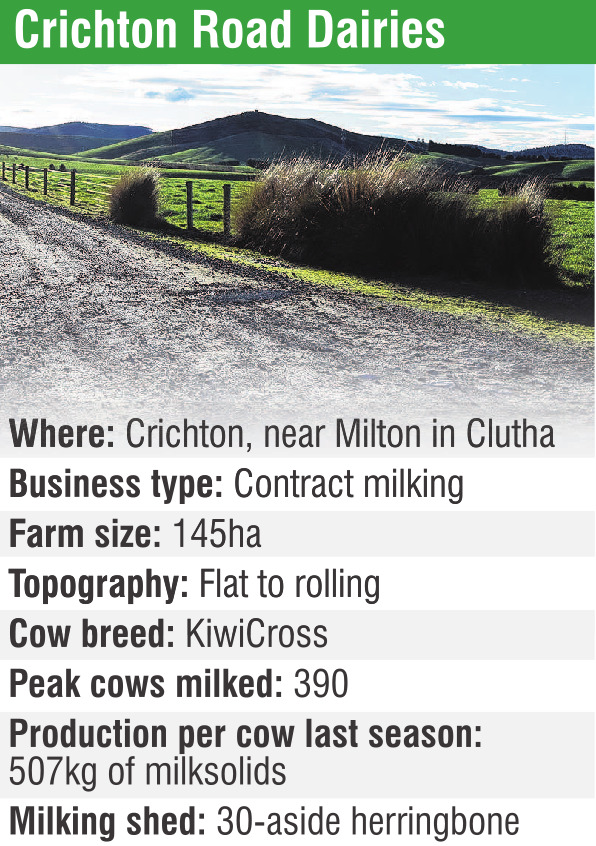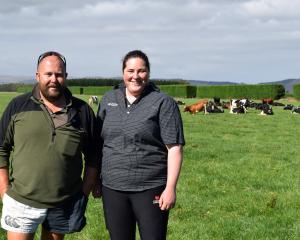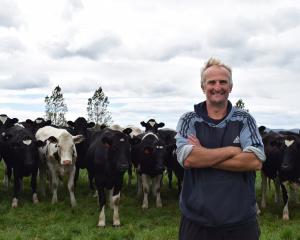
Providing cows with high quality feed will avoid a nose-dive in milk production, Clutha contract milker Marcus Frost says.
Mr Frost, 30, and his partner Jemima Aratema, 27, are in their second season contract milking 390 cows on 145ha farm Crichton Road Dairies near Milton.
The herd produced about 507kg of milksolids per cow for the 2023-24 season, their first year working on the farm.
Data from the latest New Zealand Dairy Statistics report shows the average milk production in New Zealand for the 2022-23 season was 393kg ms per cow.
At a DairyNZ field day in South Otago in April, dairy farmers were asked to share their current production rate.
Mr Frost was producing about 1.7kg of milksolids per cow, while most others were producing 1.1kg of milksolids or had dried off their herd.
Despite the herd featuring more heifers this season, the aim was to at least match the average production per cow or increase it by up to 3%, Mr Frost said.
Farm owners Scott Johnstone and Louise Oldham, who were advocates for well-fed cows, bought lucerne baleage last season as a way to maintain both milk production and body condition of the herd.
"It is the quality of feed which is keeping the cow fully fed. You can’t feed crap and hope they are going to milk," Mr Frost said.
Lucerne baleage, a high-protein feed, was more expensive than grass baleage, but was worth the extra cost due to the milk it put in the vat.
An all-grass system made it near impossible to maintain milk production and body condition for as long, he said.
Under their contract milking agreement, the farm owners paid them a fixed percentage for the milksolids produced.
Consequently, a production target needs to be hit to justify being a contract milker, he said.
"The cows have to produce to make it worthwhile."
Cows should be fed to reach their full milking potential. Feed quality varied greatly and farmers should test it before buying, he said.
"You don’t know what you’re getting unless you get it tested," he said.

Mr Frost requested more than 5ha of summer turnips be grown on Crichton Road Dairies last season,due to its high levels of metabolisable energy.
Cows fed protein and metabolisable energy produced milk for longer.
Farmers in the district had battled dry summers the past four seasons, he said.
Consequently, he would ask the farm owners to plant 2ha more of summer turnips in October.
"I think you’re better off having too much than not enough."
He preferred to be prepared for a dry summer rather than hoping for rain or quality supplementary feed being available.
Barley was fed in the milking shed and palm kernel in the paddock.
"Palm kernel is cheap and the cows love it," he said.
Nearly 400 calves were expected to arrive for about five weeks from the beginning of this month. and it was his favourite time of the year as "every day is different".
Miss Aratema said calving was "challenging, exciting, important and rewarding", as it dictated how the business performed for the rest of the season.
Calving shows the results of previous farm management decisions, including the genetics used at mating.
"That is what makes it such a good time of year."
She works in a Dunedin bakery from 4am and fed the calves when she returns home in the afternoon.
Mr Frost said his tips for surviving calving was eating well, getting as much quality sleep as possible and only worrying about things in your control.
"You can’t control the milk price or the weather — just concentrate on what you do well."
Miss Aratema said farmers should take it easy on themselves if everything did not go to plan at calving.

Mr Frost said the boyhood dream was to one day own his own farm.
His father Larry Frost had owned a dairy farm in Milton for the past 15 years.
As his father progressed in the dairy industry, the family moved around New Zealand to areas including Taranaki, Southland, Clutha, Canterbury, Southland and back to Clutha.
After Marcus left school, he studied civil engineering in Dunedin, the rough plan being to forge a career and earn enough to buy a farm.
He worked in the industry for about a year but the job differed from his expectations.
"I didn’t enjoy the red tape, paperwork and a lot of health and safety."
He then went shepherding on a sheep, beef and deer farm in Waitahuna for about 18 months.
Shepherding made him realise red meat production was unlikely to be a pathway to realising his dream of farm ownership.
"There was no way I was going to get near farm ownership on a sheep farm."
He then entered the dairy industry, working his way from second-in-command to production manager on farms in South Otago
The couple then progressed to their first season contract milking in North Otago in the 2023-23 season and Miss Aratema began working in the business as a calf rearer.
Originally, the next step on the path to farm ownership was to secure a 50:50 sharemilking arrangement but rising interest rates and input costs and softer commodity prices had him wondering if his dream could be realised by working on a farm.
"Something has to change, either land prices have to come down or commodity prices have to lift quite a bit to make farming more viable."
He stayed farming because the work provides variety and he enjoys working with animals, machinery and being outdoors.
Many young people discounted careers in the primary sector because other professions were less stressful, required less effort and paid more.
"Why would you want to get in a industry where you have a humongous amount of debt and your return is very little? It is a hard game to be in."














